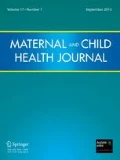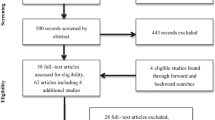Abstract
Early parenting practices are significant to public health because of their linkages to child health outcomes. This paper focuses on the current state of the science regarding conceptual frameworks that incorporate early parenting practices in epidemiologic research and evidence supporting reliability and validity of self-report measures of such practices. Guided by a provisional definition of early parenting practices, literature searches were conducted using PubMed and Sociological Abstracts. Twenty-five published studies that included parent-report measures of early parenting practices met inclusion criteria. Findings on conceptual frameworks were analyzed qualitatively, whereas evidence of reliability and validity were organized into four domains (safety, feeding and oral health, development promotion, and discipline) and summarized in tabular form. Quantitative estimates of measures of reliability and validity were extracted, where available. We found two frameworks incorporating early parenting: one a program theory and the other a predictive model. We found no reported evidence of the reliability or validity of parent-report measures of safety or feeding and oral health practices. Evidence for reliability and validity were reported with greater frequency for development promotion and discipline practices, but report of the most pertinent type of reliability estimation, test–retest reliability, was rare. Failure to examine associations of early parenting practices with any child outcomes within most studies resulted in missed opportunities to indirectly estimate validity of parenting practice measures. Stronger evidence concerning specific measurement properties of early parenting practices is important to advancing maternal-child research, surveillance, and practice.
Similar content being viewed by others
References
National Research Council and Institute of Medicine. (2000). From neurons to neighborhoods: The science of early childhood development. Committee on Integrating the Science of Early Childhood Development, J. P. Shonkoff & D. A. Phillips (Eds.), Board on Children, Youth, and Families. Washington, DC: National Academy Press.
Gunnar, M. R., & Quevedo, K. M. (2008). Early care experiences and the HPA axis regulation in children: A mechanism for later trauma vulnerability. Progress in Brain Research, 167, 137–149.
Warren, S. F., & Brady, N. C. (2007). The role of maternal responsivity in the development of children with intellectual disabilities. Mental Retardation and Developmental Disabilities Research Reviews, 13, 330–338.
McEwen, B. S. (2003). Early life influences on life-long patterns of behavior and health. Mental Retardation and Developmental Disabilities Research Reviews, 9, 149–154.
Whitaker, R. C., Orzol, S. M., & Kahn, R. S. (2006). Maternal mental health, substance use, and domestic violence in the year after delivery and subsequent behavior problems in children at age 3 years. Archives of General Psychiatry, 63, 551–560.
Øyen, N., Markestad, T., Skjærven, R., et al. (1997). Combined effects of sleeping position and prenatal risk factors in sudden infant death syndrome: The Nordic epidemiological SIDS study. Pediatrics, 100, 613–621.
Centers for Disease Control and Prevention. (2005). Retrieved on January 27, 2009, at: http://www.webapp.cdc.gov/cgi-bin/broker.exe?_service=v8prod&_server=app-v-ehip-wisq.cdc.gov&_port=5082&_sessionid=zd4fPhv2L52&_program=wisqars.details10.sas&_service=&type=U&prtfmt=STANDARD&age1=1&age2=4&agegp=1-4&deaths=1664&_debug=0&lcdfmt=lcd1ageðnicty=0&ranking=10&deathtle=Death.
American Academy of Pediatrics, Task Force on infant Positioning and SIDS. (1992). Positioning and SIDS. Pediatrics, 89, 1120–1126.
American Academy of Pediatrics, Work Group on Breastfeeding. (1997). Breastfeeding and the use of human milk. Pediatrics, 100, 1035–1039.
American Academy of Pediatrics, Committee on Psychosocial Aspects of Child and Family Health. (1998). Guidance for effective discipline. Pediatrics, 101, 723–728.
U. S. Department of Health and Human Services. (2000). Healthy people 2010 (Conference edition, in Two Volumes). Washington, DC: Author.
Guyer, B., Hughart, N., Strobino, D., et al. (2000). Assessing the impact of pediatric-based developmental services on infants, families, and clinicians: Challenges to evaluating the Healthy Steps program. Pediatrics, 105, e33.
Chung, E. K., McCollum, K. F., Elo, I. T., et al. (2004). Maternal depressive symptoms and infant health practices among low-income women. Pediatrics, 113, e523–e529.
Leiferman, J. (2002). The effect of maternal depressive symptomatology on maternal behaviors associated with child health. Health Education & Behavior, 29, 596–607.
McLearn, K. T., Minkovitz, C. S., Strobino, D. M., et al. (2006). Maternal depressive symptoms at 2 to 4 months post partum and early parenting practices. Archives of Pediatrics and Adolescent Medicine, 160, 279–284.
McLearn, K. T., Minkovitz, C. S., Strobino, D. M., et al. (2006). The timing of maternal depressive symptoms and mothers’ parenting practices with young children: Implications for pediatric practice. Pediatrics, 118, e174–e182.
McLennan, J. D., & Kotelchuck, M. (2000). Parental prevention practices for young children in the context of maternal depression. Pediatrics, 105, 1090–1095.
Paulson, J. F., Dauber, S., & Leiferman, J. A. (2006). Individual and combined effects of postpartum depression in mothers and fathers on parenting behavior. Pediatrics, 118, 659–668.
Darling, N., & Steinberg, L. (1993). Parenting style as context: An integrative model. Psychological Bulletin, 113, 487–496.
Kolobe, T. H. (2004). Childrearing practices and developmental expectations for Mexican-American mothers and the developmental status of their infants. Physical Therapy, 84, 439–453.
Zeitlin, M., Ghassemi, H., & Mansour, M. (1990). Positive deviance in child nutrition—with emphasis on psychosocial and behavioural aspects and implications for development. Tokyo, Japan: The United Nations University.
Fishbein, M., & Ajzen, I. (1975). Belief, attitude, intention and behavior: An introduction to theory and research. Reading, PA: Addison-Wesley.
Bowling, A. (2005). Techniques of questionnaire design. In A. Bowling & S. Ebrahim (Eds.), Handbook of health research methods: Investigation, measurement, and analysis (pp. 394–427). New York: Open University Press.
DeVellis, R. F. (2003). Scale development: Theory and applications (2nd ed.). Thousand Oaks, CA: Sage.
Pedhazer, E. J., & Schmelkin, L. P. (1991). Measurement, design, and analysis: An integrated approach. Hillsdale, NJ: Erlbaum.
Gordis, L. (2000). Epidemiology (2nd ed.). Philadephia: Saunders.
Minkovitz, C., Strobino, D., Hughart, N., et al. (2001). Early effects of the healthy steps for young children program. Archives of Pediatrics and Adolescent Medicine, 155, 470–479.
Bronte-Tinkew, J., Zaslow, M., Capps, R., et al. (2007). Food insecurity works through depression, parenting, and infant feeding to influence overweight and health in toddlers. Journal of Nutrition, 137, 2160–2165.
Burbach, A. D., Fox, R. A., & Nicholson, B. C. (2004). Challenging behaviors in young children: The father’s role. Journal of Genetic Psychology, 165, 169–183.
Horn, I. B., Cheng, T. L., & Joseph, J. (2004). Discipline in the African American community: The impact of socioeconomic status on beliefs and practices. Pediatrics, 113, 1236–1241.
Regalado, M., Sareen, H., Inkelas, M., et al. (2004). Parents’ discipline of young children: Results from the National Survey of Early Childhood Health. Pediatrics, 113(Suppl 6), 1952–1958.
Vladutiu, C. J., Nansel, T. R., Weaver, N. L., et al. (2006). Differential strength of association of child injury prevention attitudes and beliefs on practices: A case for audience segmentation. Injury Prevention, 12, 35–40.
Leiferman, J. A., Ollendick, T. H., Kunkel, D., et al. (2005). Mothers’mental distress and parenting practices with infants and toddlers. Archives of Women’s Mental Health, 8, 243–247.
Broder, H., Reisine, S., & Johnson, R. (2006). Role of African-American fathers in child-rearing and oral health practices in an inner city environment–A brief communication. Journal of Public Health Dentistry, 66, 138–143.
Chung, E. K., Mathew, L., McCollum, K. F., et al. (2008). Continuous source of care among young underserved children: Associated characteristics and use of recommended parenting practices. Ambulatory Pediatrics, 8, 36–42.
Johnston, B. D., Huebner, C. E., Anderson, M. L., et al. (2006). Healthy Steps in an integrated delivery system: Child and parent outcomes at 30 months. Archives of Pediatrics and Adolescent Medicine, 160, 793–800.
Martorell, G. A., & Bugental, D. B. (2006). Maternal variations in stress reactivity: Implications for harsh parenting practices with very young children. Journal of Family Psychology, 20, 641–647.
McDonald, E. M., Solomon, B., Shields, W., et al. (2005). Evaluation of kiosk-based tailoring to promote household safety behaviors in an urban pediatric primary care practice. Patient Education and Counseling, 58, 168–181.
Mendelsohn, A. L., Valdez, P. T., Flynn, V., et al. (2007). Use of videotaped interactions during pediatric well-child care: Impact at 33 months on parenting and on child development. Journal of Developmental and Behavioral Pediatrics, 28, 206–212.
Minkovitz, C. S., Hughart, N., Strobino, D., et al. (2003). A practice-based intervention to enhance quality of care in the first 3 years of life: The Healthy Steps for Young Children program. Journal of the American Medical Association, 290, 3081–3091.
Neuhauser, L., Constantine, W. L., Constantine, N. A., et al. (2007). Promoting prenatal and early childhood health: Evaluation of a statewide materials-based intervention for parents. American Journal of Public Health, 97, 1813–1819.
Pears, K., Capaldi, D. M., & Owen, L. D. (2007). Substance use risk across three generations: The roles of parent discipline practices and inhibitory control. Psychology of Addictive Behaviors, 21, 373–386.
Socolar, R., Savage, E., Devellis, R. F., et al. (2004). The discipline survey: A new measure of parental discipline. Ambulatory Pediatrics, 4, 166–173.
Wissow, L. S. (2001). Ethnicity, income, and parenting contexts of physical punishment in a national sample of families with young children. Child Maltreatment, 6, 118–129.
Centers for Disease Control, Prevention. (1996). Sudden infant death syndrome—United States, 1983–1994. Morbidity and Mortality Weekly Report, 45, 859–863.
Dewey, K. G., Heinig, J., & Nommsen-Rivers, L. A. (1995). Differences in morbidity between breast-fed and formula-fed infants. Journal of Pediatrics, 126, 696–702.
Bus, A. G., van Ijzendoorn, M. H., & Pellegrini, A. D. (1995). Joint book reading makes for success in learning to read: A meta-analysis on intergenerational transmission of literacy. Review of Educational Research, 65, 1–21.
Robertson, A. S., Rivara, F. P., Ebel, B. E., et al. (2005). Validation of parent self reported home safety practices. Injury Prevention, 11, 209–212.
Cronbach, L. J., & Meehl, P. E. (1967). Construct validity in psychological tests. In D. N. Jackson & S. Messick (Eds.), Problems in human assessment (pp. 57–77). New York: McGraw-Hill.
Centers for Disease Control and Prevention. (2006). Data2010…The Healthy People Database. Retrieved October 24, 2006, from: http://www.wonder.cdc.gov/data2010/OBJ.Htm.
Acknowledgments
Partial support for this review was received from the Education for Leadership HRSA MCHB Training Grant #T76MC00008, University of Alabama at Birmingham. We thank Robert H. Bradley, Professor and Director, Family and Human Dynamics Research Institute, Arizona State University, for his comments and insights on an earlier draft of this paper.
Author information
Authors and Affiliations
Corresponding author
Rights and permissions
About this article
Cite this article
Walker, L.O., Kirby, R.S. Conceptual and Measurement Issues in Early Parenting Practices Research: An Epidemiologic Perspective. Matern Child Health J 14, 958–970 (2010). https://doi.org/10.1007/s10995-009-0532-8
Published:
Issue Date:
DOI: https://doi.org/10.1007/s10995-009-0532-8




